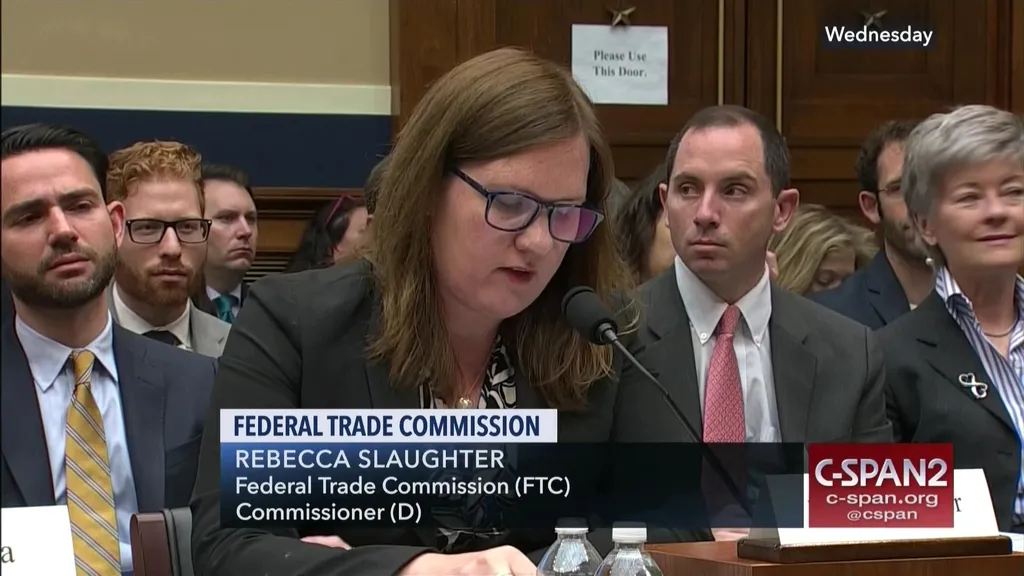Slaughter Named FTC Chair, Combatting Disinformation with Community Media, Kimmelman Departs Public Knowledge
January 22, 2021—President Joe Biden designated Rebecca Slaughter as acting chair of the Federal Trade Commission on Thursday. Slaughter has served as an FTC Commissioner since May 2018. As a commissioner, Slaughter championed aggressive use of the FTC’s authorities to combat the abuse of consumers’
Jericho Casper

January 22, 2021—President Joe Biden designated Rebecca Slaughter as acting chair of the Federal Trade Commission on Thursday. Slaughter has served as an FTC Commissioner since May 2018.
As a commissioner, Slaughter championed aggressive use of the FTC’s authorities to combat the abuse of consumers’ data, growing threats to competition, and systemic racism. She has further advocated for greater resources for the FTC and promoted equity and inclusion efforts.
“I am deeply honored and grateful to lead an agency that is critical to helping the U.S. economy get back on its feet and function more fairly for all Americans,” Slaughter said in a statement released Thursday. “I want to express my sincere appreciation for the excellent leadership of Chairman Simons during a time of unprecedented challenges.”
Outgoing chairman, Joseph Simons, said on Tuesday that he would resign effective January 29, along with members of his senior staff, including Democratic Commissioner Rohit Chopra. With those departures, Slaughter will be left to work with two Republican commissioners, Noah Phillips and Christine Wilson, on pressing consumer protection issues.
The agency filed a big antitrust lawsuit against Facebook last month, which accused the social media giant of seeking to either buy or crush smaller competitors. The lawsuit is one of several filed by federal and state enforcers against Google or Facebook. The agency also has an antitrust investigation underway of Amazon.
Combating disinformation requires urgent, hefty investments in community media
The U.S. Capitol attack revealed that much work remains in determining the role of digital media platforms in exacerbating and weaponizing disinformation.
Indeed, many of our societal ills – the mainstreaming of white nationalism, losing parties attacking the legitimacy of certified elections, and a growing distrust of electoral and public health systems – can be traced to systems of disinformation that have proliferated through digital technologies and social media, wrote Karthick Ramakrishnan, professor of public policy at the University of California Riverside, in a CalMatters post.
While the events of January 6 revealed that oversight of social media platforms is pressing, Ramakrishnan notes that “we cannot rely on regulation alone,” arguing that in addition to stopping the virulent spread of disinformation through digital media, we also need to invest in the production of good, reliable information that can fill the void
Current efforts to reinvigorate non-profit journalism are minuscule, compared to the scale of the problem. Researchers at the University of North Carolina discovered a decline of 1,800 newspapers between 2004 and 2018, with losses particularly acute in suburban and rural areas.
Ramakrishnan writes that one promising option is to reinvest in community media clusters that proved critical for outreach on the 2020 Census.
For example, the state of California dedicated more than $46 million to its Census outreach and public relations campaign, with an emphasis on local ethnic media to “build a base of trusted messengers, break down language access barriers for non-English speakers and facilitate culturally appropriate engagement within communities.”
Ramakrishnan writes that it is imperative the U.S. pay urgent attention to investing in local, community media, as well as “ethnic media” or “media of color”, to build an ecosystem of reliable and trustworthy news that can serve the needs of our 21st-century democracy.
Senior Advisor Gene Kimmelman resigns from Public Knowledge to join Justice Department
Public Knowledge Senior Advisor Gene Kimmelman announced his resignation from the advocacy organization in order to serve a limited-duration position as senior counselor for Biden’s Associate Attorney General at the Department of Justice.
Kimmelman’s leadership as Public Knowledge’s second president and CEO, and recently as a senior advisor, helped expand the issues the organization advocates for on behalf of technology users and consumers to include the importance of competition policy and antitrust law, beginning an organizational commitment to building a diverse generation of public interest advocates to follow his tenure.
“The entire Public Knowledge family is grateful for Gene’s seven years at our organization, part of Gene’s long career of working on behalf of the public interest in government and the nonprofit sector,” said Public Knowledge CEO Chris Lewis in a statement.
“With so many challenges to be faced in tech policy, we will continue to champion these priorities so that the average technology user is protected from harmful monopolies and gatekeepers; gains equitable access to communications tools and creative works; and enjoys free expression balanced against the powerful harms facing our society online,” Lewis said.









Member discussion